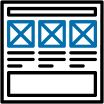
ERP stands for Enterprise Resource Planning. It is a software system that integrates various business processes and functions within an organization into a single platform. ERP systems typically cover areas such as finance, human resources, manufacturing, supply chain management, customer relationship management, and more.

HRMS stands for Human Resource Management System. It is a software system designed to manage and automate various human resource functions within an organization. HRMS is sometimes used interchangeably with HRIS (Human Resource Information System)Employee Information Management,Payroll Managemen

CRM stands for Customer Relationship Management. It refers to a strategy, approach, or system that helps businesses manage and nurture their relationships with customers. CRM encompasses both the processes and technologies used to acquire, retain, and grow customer interactions and relationships.

Accounting solutions, also known as accounting software or financial management software, are software applications designed to streamline and automate accounting processes within organizations. These solutions help businesses manage their financial transactions, track expenses and revenues, and generate financial reports.
Tracking software refers to software applications or tools that are used to monitor and track various aspects of business operations, projects, or activities. These software solutions help businesses gather data, monitor progress, and gain insights into performance metrics. Here are some common types of tracking software.

Custom solutions, also known as custom software or bespoke software, refer to software applications or systems that are specifically designed and developed to meet the unique requirements of a particular organization or business Unlike off-the-shelf software that is readily available in the market.






 Whatsapp
Whatsapp













